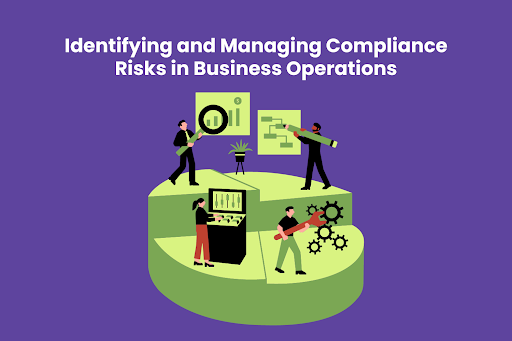
Compliance risk has become a central concern for companies of all sizes. It is a risk that stems from violating laws, regulations, codes of conduct, or organizational standards of practice. To mitigate these risks, businesses increasingly seek Compliance Certification, a testament to their adherence to necessary legal and ethical standards. This blog delves into the identification and management of Compliance Risk in business operations, offering insights into best practices and strategies to ensure regulatory adherence and ethical conduct.
Understanding Compliance Risk
Compliance risk, often referred to as integrity risk, involves the legal penalties, financial forfeiture, and material loss a company faces when it fails to act in accordance with industry laws and regulations, ethical standards, and its own policies. Identifying these risks requires a comprehensive understanding of the regulatory environment, as well as a keen insight into the operational aspects of the business.
Key Areas of Compliance Risk
- Regulatory Changes: Frequent changes in laws and regulations can create a moving target for compliance.
- Global Operations: Different countries have varied compliance requirements, complicating the compliance landscape for multinational companies.
- Technology Use: Advancements in technology, especially data management and privacy, continually reshape the compliance framework.
Steps to Identify Compliance Risks
- Risk Assessment: Regular risk assessments should be conducted to identify potential areas of non-compliance.
- Audit and Monitoring: Continuous audits and monitoring can help in early detection of compliance lapses.
- Stakeholder Engagement: Engaging with employees, customers, and regulatory bodies can provide insights into potential compliance risks.
Developing a Compliance Risk Management Plan
A robust compliance risk management plan is essential for mitigating risks effectively. Here’s how to develop one:
- Policy Development: Create clear, comprehensive compliance policies that are easily understandable and accessible to all employees.
- Training and Communication: Regular training sessions and clear communication channels ensure that employees are aware of compliance requirements.
- Compliance Certification: Obtaining certifications like ISO 27001 for information security or ISO 9001 for quality management can reinforce a company’s commitment to compliance.
- Technology Utilization: Implementing compliance management software can streamline compliance processes and improve oversight.
- Third-Party Management: Ensure that your business partners and vendors adhere to similar compliance standards.
The Role of Leadership in Compliance Risk Management
Leadership plays a pivotal role in shaping the compliance culture of an organization. They must demonstrate a commitment to compliance and ethics, setting a tone at the top that promotes integrity and accountability. Effective leaders ensure that compliance is integrated into business strategies and that adequate resources are allocated for compliance management.
Benefits of Compliance Certification
Compliance certification goes beyond merely meeting legal requirements; it is a strategic investment in a company’s future. Here are expanded benefits:
Enhanced Reputation
Certification signals to stakeholders, including customers, investors, and regulators, that the company is committed to ethical practices and high standards. This trust can be pivotal in decision-making processes and in building long-term business relationships.
Risk Mitigation
By identifying and addressing compliance gaps, certifications help in significantly reducing the likelihood of legal penalties and financial losses. It provides a structured approach to regularly review and update compliance measures in line with evolving regulations.
Competitive Advantage
In a crowded market, being certified can distinguish a business, making it more attractive to potential clients and partners who prioritize compliance and ethical operations.
Improved Operational Efficiency
Compliance certifications often lead to the streamlining of processes, resulting in improved operational efficiency. This efficiency can lead to cost savings and more effective resource utilization.
Employee Morale and Retention
A clear commitment to compliance and ethics can positively impact employee morale, fostering a workplace culture that values integrity and transparency. This, in turn, can lead to higher employee retention rates and attract talent looking for responsible employers.
Technology’s Role in Managing Compliance Risk
Advancements in technology have provided businesses with tools to better manage compliance risks. Compliance software can automate many aspects of compliance management, from tracking regulatory changes to reporting non-compliance issues. Artificial Intelligence (AI) and Machine Learning (ML) can predict potential areas of risk, allowing for preemptive action.
Best Practices for Compliance Risk Management
- Continuous Improvement: Regularly update compliance programs to adapt to the changing regulatory environment.
- Employee Engagement: Encourage a culture where employees feel comfortable reporting compliance issues.
- Data-Driven Decision Making: Use data analytics to identify trends and patterns in compliance risks.
Conclusion
Managing compliance risks is an ongoing process that requires diligence, foresight, and a proactive approach. By understanding the complexities of compliance risk, developing a robust management plan, and utilizing tools like compliance certifications, businesses can safeguard themselves against legal and financial repercussions. Ultimately, a strong commitment to compliance fosters a culture of integrity and ethical business practices, contributing to long-term success and sustainability. For more information visit: The Knowledge Academy.

Your go-to source for the latest in tech, finance, health, and entertainment, with a knack for distilling complex topics into accessible insights, We deliver timely updates on the ever-evolving landscapes of technology, finance, health, and entertainment








